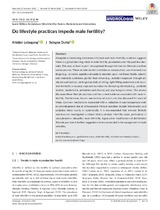Do lifestyle practices impede male fertility?
Abstract
Alongside an increasing prevalence of couple and male infertility, evidence suggests
there is a global declining trend in male fertility parameters over the past few decades.
This may, at least in part, be explained through detrimental lifestyle practices
and exposures. These include alcohol and tobacco consumption, use of recreational
drugs (e.g., cannabis, opioids and anabolic steroids), poor nutritional habits, obesity
and metabolic syndrome, genital heat stress (e.g., radiation exposure through cell
phones and laptops, prolonged periods of sitting, tight-fitting underwear and recurrent
hot baths or saunas), exposure to endocrine-disrupting chemicals (e.g., pesticide
residue, bisphenol A, phthalates and dioxins) and psychological stress. This review
discusses these lifestyle practices and the current evidence associated with male infertility.
Furthermore, known mechanisms of action are also discussed for each of
these. Common mechanisms associated with a reduction in spermatogenesis and/
or steroidogenesis due to unfavourable lifestyle practices include inflammation and
oxidative stress locally or systemically. It is recommended that relevant lifestyle
practices are investigated in clinical history of male infertility cases, particularly in
unexplained or idiopathic male infertility. Appropriate modification of detrimental
lifestyle practices is further suggested and recommended in the management of male
infertility.

